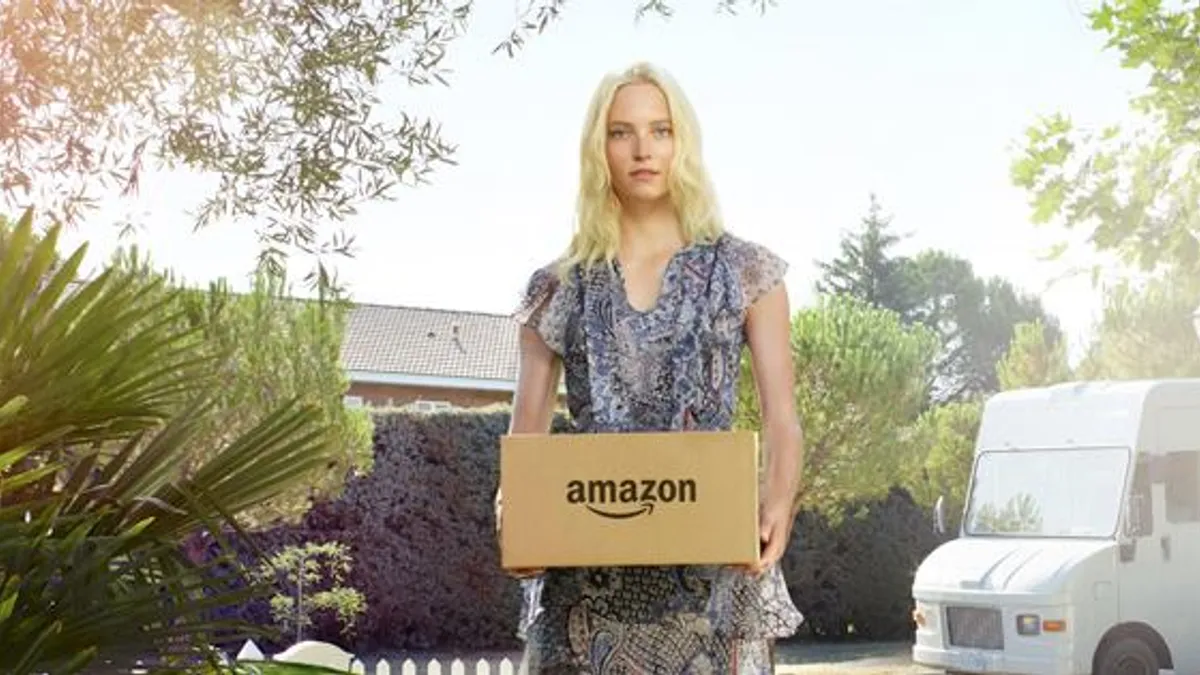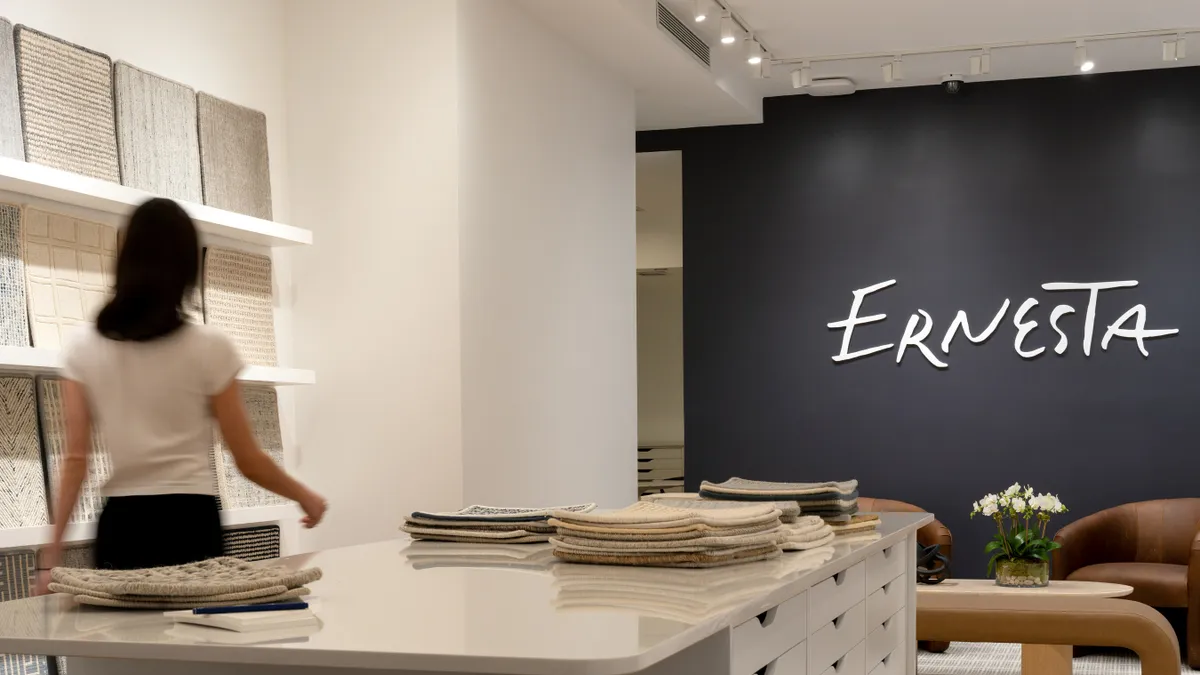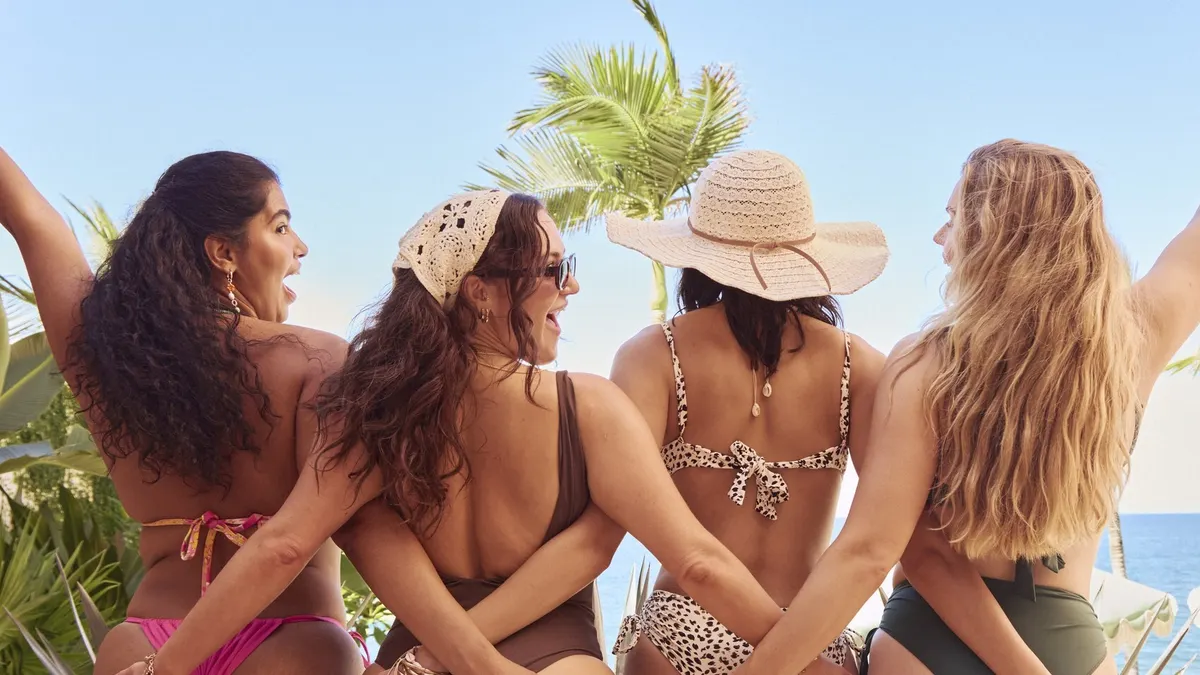For years analysts have expected Amazon apparel sales to bypass market leaders like Macy's and Walmart at some point. In September, that seemed imminent when Wells Fargo predicted the e-commerce giant is on pace to become the top U.S. retailer of apparel this year.
Amazon sells plenty of clothing and footwear from other brands, but lately it has been ramping up private label fashion. Amazon has more private labels than many observers previously thought and continues to develop even more (most recently a Prime-exclusive private-label pet food), but most of its private labels — 66 of 74, as of June — are in apparel, according to Coresight Research.
Department stores and other major apparel merchants have watched in alarm as Amazon has pushed further into apparel, considering the e-commerce giant's runaway success with its private label AmazonBasics brand. And there's more to come, judging from recent trademark applications.
One likely reason Amazon is moving into fashion is because higher income women make up an important segment of its customer base, according to Matt Sargent, senior vice president of retail at consulting firm Magid. Private label has become an increasingly important way for many retailers to differentiate their merchandise. Several retailers, most notably including Target and Walmart, have introduced new private brands or revamped existing ones this year.
Apparel is not so easy
And that, it turns out, is a serious challenge for Amazon. Amazon’s private label apparel, especially for women, is struggling: Of the 10 worst performing Amazon private labels in any category, nine were women's or girls clothing, and most (82%) of its women’s clothing lines fail to sell more than 100 units per month, according to research from Amazon seller data platform Jungle Scout.
Amazon sells three times more men’s apparel than women’s per month, on average, Jungle Scout found. Other categories fare better: AmazonBasics, the top private label selling a range of household items, sells three times more units (and sees $604,500 each month in revenue) than its number two, consumer product brand Presto, which notches an average $108,735 each month.
The e-commerce giant is working to find ways for customers to try out merchandise, including free returns on some items, its "try-before-you-buy" Prime Wardrobe service, the new Pinterest-like visual shopping tool Amazon Scout and its new SnapChat Amazon Visual Search partnership, Jungle Scout noted.
Apparel, furniture and higher-end items are much harder to sell, especially to women, than less expensive, more basic products like batteries and paper towels, according to Jungle Scout CEO-founder Greg Mercer. "We believe it is because these are more 'hands-on' products," he wrote in a blog post. "Women want to try on their clothing before they buy it. Furniture needs to be sat on, felt, and visualized. High-end products require more social proof and other hands-on experience."
As Jungle Scout notes, Amazon is working to find ways to fill that need online. But digital experiences aren't cutting it, according to Sargent. "Amazon is willing to experiment with this — it's why they’ve pushed the ability to share your outfits. If you can virtually try on an outfit and send it around to your friends, that might change, but we’re not there yet," Sargent told Retail Dive in an interview.
The store advantage
In fact, so far none of those efforts have come close to the advantage private labels have when they're sold by brick-and-mortar retailers, according to research from Magid, which found that merchandising within a physical store promotes trust.
"If I see a private label, like Target's Goodfellow, physically in a store — especially if I see it next to a national brand, I know it’s real and I know that Target believes in it so much that they’ve brought it into this store and all their stores across the nation," Sargent said. "That ability to have product on shelf allows people to feel much more confident in a new brand, versus a digital brand. Digital to some extent is still not real — it’s virtual."
For its recent research into consumers’ eagerness to shop private label apparel, Magid explored their awareness of various retailers’ private labels and their willingness to consider those labels whether or not they were aware of them. Magid assessed attitudes toward Amazon’s private apparel compared to that at Nordstrom, Walmart, Kohl's, Macy's, and others, with similar results.
For Target’s new Universal Threads brand: 30% were aware of it, while 65% would consider it. By contrast, Amazon’s Coastal Blue brand enjoyed a similar level of awareness (33%), but shoppers’ consideration level was just 44%. "Even Amazon’s highest considered brand is lower than Target’s lowest considered brand. Amazon is on the low end and, Kohl’s, J.C. Penney, Macy’s — Amazon trails all of them," Sargent said of the findings. "That’s telling you that Amazon really faces an uphill battle in the space, and if I were Kohl's or J.C. Penney or Target or Walmart I’d be jumping at this news."
The importance of expertise
Consumers trust private labels when they're viewed as coming from a retailer's core strength or specialty, Sargent said.
"REI will do really well at tents and their very specific outdoor apparel. They’ve done this for long enough, people trust them," he said. "It’s not a surprise to me that Amazon, which is a tech company at its roots, is doing well with their tablets, their Fire sticks or their power cords and batteries— it fits within our expectation of what they do."
Amazon doesn't have category expertise in the apparel space — yet, according to Sargent. "That’s a headwind," he said. "That isn’t to say they shouldn't do it, it’s just going to take a while."






















